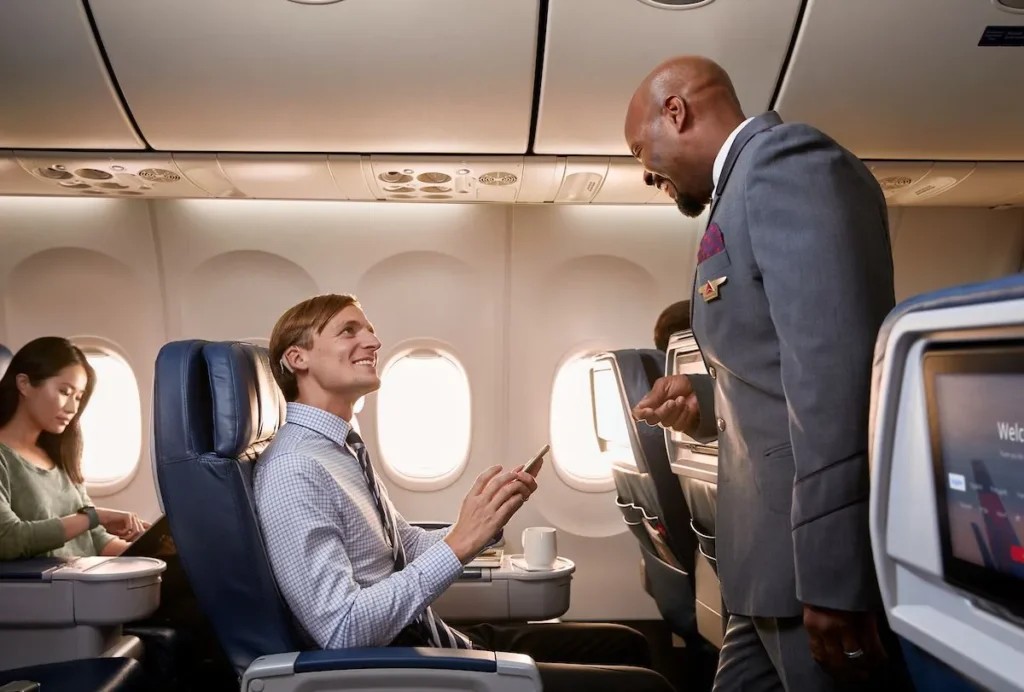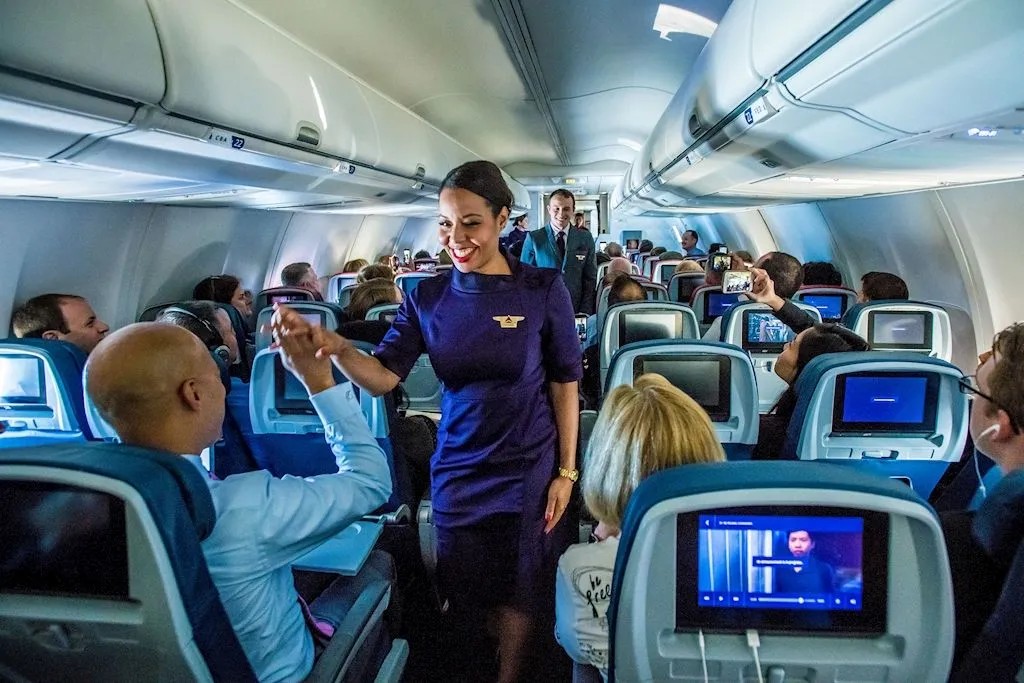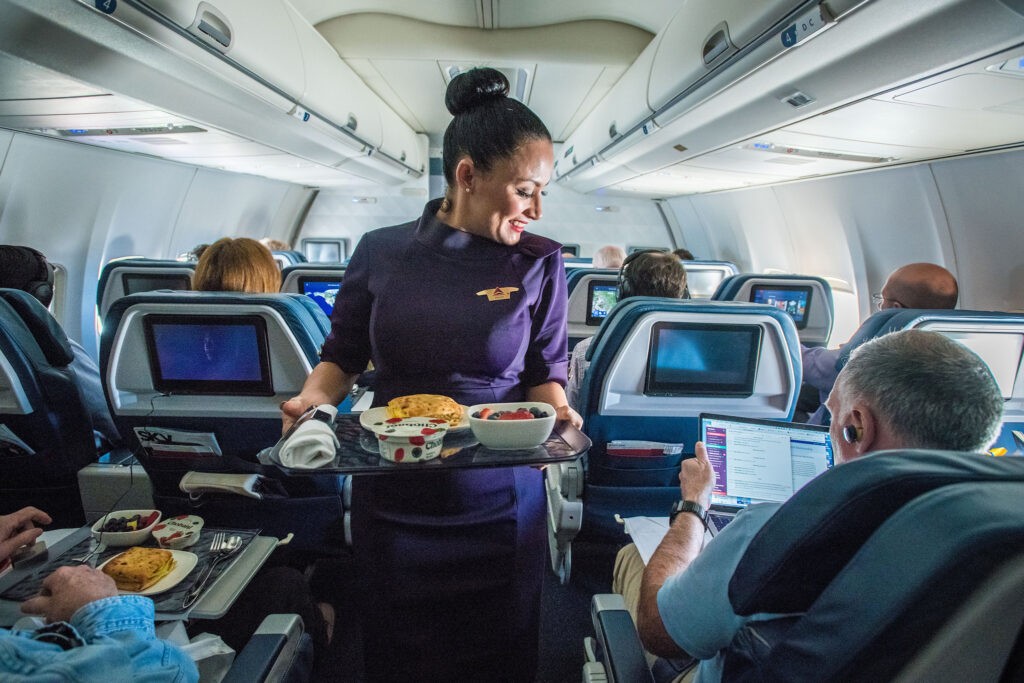How Much Do Flight Attendants Make Per Hour is a question many aspiring aviation professionals ask, and HOW.EDU.VN is here to provide a detailed answer. Understanding the flight attendant hourly wage, including factors like experience, airline, and location, is essential for anyone considering this career path. Let’s explore the earning potential and the opportunities within this exciting field, offering clarity and insights to guide your career decisions, ensuring you make well-informed choices.
1. Understanding Flight Attendant Compensation
Flight attendants’ compensation is structured around several components, with the hourly wage being a primary factor. However, it’s crucial to understand how this hourly rate works in practice. Flight attendants are typically paid for flight hours, which are the actual time spent in the air. Time spent during boarding, delays, or layovers may be compensated differently or not at all, depending on the airline’s policies. This system can affect the overall take-home pay.
Additional factors that influence flight attendant income include per diem allowances for meals and expenses during layovers, which can vary based on domestic or international destinations. Some airlines also offer bonuses for performance or additional responsibilities, such as serving as a lead flight attendant or working on international routes. Understanding these nuances is key to grasping the complete financial picture for flight attendants. For example, Delta Airlines recently introduced a boarding premium, which adds to the annual pay, reflecting an effort to enhance job satisfaction and recognize the importance of this duty.
2. Delta Airlines Flight Attendant Salaries
Delta Airlines is a major U.S. carrier known for its comprehensive employee benefits and competitive pay. The Delta Airlines flight attendant salary structure reflects the company’s commitment to attracting and retaining top talent. New hires at Delta can expect an hourly rate that starts competitively, with incremental increases based on years of service. Delta Airlines Flight Attendant salaries typically start with an hourly wage ranging from $35 to $80, which translates to an annual salary between $45,000 and $104,400, depending on hours worked.
Here is a look at the hourly and annual salaries for Delta flight attendants based on experience:
| Years of Service | Hourly Rate (Effective 6/1/2024) | Annual Pay (1,300 hrs) |
|---|---|---|
| Start | $35.50 | $46,150 |
| After 1 year | $37.64 | $48,932 |
| After 2 years | $40.05 | $52,065 |
| After 3 years | $42.65 | $55,445 |
| After 4 years | $46.97 | $61,061 |
| After 5 years | $53.18 | $69,134 |
| After 6 years | $58.19 | $75,647 |
| After 7 years | $60.05 | $78,065 |
| After 8 years | $61.70 | $80,210 |
| After 9 years | $64.02 | $83,226 |
| After 10 years | $65.77 | $85,501 |
| After 11 years | $68.92 | $89,596 |
| After 12 years | $79.80 | $103,740 |




These figures highlight the potential for significant income growth as flight attendants gain experience. Moreover, Delta’s recent pay increases, including a 5% raise for flight attendants and ground workers, underscore the airline’s dedication to its employees.
3. Factors Affecting Flight Attendant Hourly Wage
Several factors influence how much a flight attendant makes per hour. These include experience, location, type of flight, and any additional qualifications or roles.
3.1. Experience and Seniority
Experience is a primary driver of increased hourly wages for flight attendants. As they accumulate years of service, their pay generally increases according to a pre-determined scale. For instance, a flight attendant with over five years of experience can see hourly rates increase significantly. Senior flight attendants may also have opportunities to work on more desirable routes or take on additional responsibilities, leading to higher overall earnings.
3.2. Location and Base
The location of a flight attendant’s base can also impact their earnings. Flight attendants based in major metropolitan areas or those who work international routes may receive higher pay due to the cost of living and increased demand for services in these areas. Delta Airlines has several crew bases across the United States, including Atlanta, Detroit, Los Angeles, and New York City, among others.
3.3. Type of Flight (Domestic vs. International)
Flight attendants working international routes often receive higher per diem rates and may be eligible for additional compensation due to the complexities and demands of international travel. These routes often require additional language skills and cultural sensitivity, which are compensated accordingly.
3.4. Additional Qualifications and Roles
Flight attendants with additional qualifications, such as fluency in multiple languages, may be eligible for higher pay. Bilingual flight attendants are particularly valuable for international routes, where they can assist passengers who may not speak English. Additionally, those who take on roles such as lead flight attendant or trainers may receive additional hourly compensation.
3.5. Union Representation
Union representation can significantly impact flight attendant wages and benefits. Unions negotiate collective bargaining agreements that set pay scales, benefits, and working conditions. Airlines with unionized flight attendants often have more standardized and potentially higher compensation packages compared to those without union representation.
4. Benefits and Perks for Flight Attendants
In addition to the hourly wage, flight attendants receive a range of benefits and perks that can significantly enhance their overall compensation package.
4.1. Health and Insurance Benefits
Airlines typically provide comprehensive health insurance options, including medical, dental, and vision coverage. These plans often allow employees to choose from various options based on their individual needs and locations. Life insurance coverage is also typically provided, with options for additional coverage.
4.2. Financial Benefits
Many airlines offer profit-sharing programs and 401(k) retirement plans, allowing employees to save for the future while benefiting from the company’s financial success. Delta Airlines, for example, has distributed billions to its employees through profit-sharing since 2007.
4.3. Paid Leave and Time Off
Flight attendants are generally entitled to generous leave policies that increase with tenure. This includes vacation leave, sick leave, and various forms of paid leave, such as maternity and paternity leave.
4.4. Travel Benefits
One of the most appealing perks for flight attendants is the ability to travel for free or at a reduced rate on their airline’s flights. This benefit often extends to eligible family members as well. Flight attendants can also access non-revenue travel on partner airlines through interline agreements. Standby travel options provide additional flexibility for personal or business trips without incurring high costs.
4.5. Wellness Programs
Some airlines promote employee wellness by offering free or subsidized gym memberships at corporate fitness centers. These initiatives help maintain a healthy workforce and encourage physical fitness among employees.
5. Comparing Flight Attendant Salaries Across Airlines
While Delta Airlines offers competitive compensation, it’s essential to compare salaries across different airlines to get a broader perspective.
| Airline | Starting Hourly Rate (Approximate) | Average Annual Salary (Approximate) |
|---|---|---|
| Delta Airlines | $35.50 | $50,638 |
| American Airlines | $33.00 | $48,000 |
| United Airlines | $34.00 | $49,000 |
| Southwest Airlines | $32.00 | $47,000 |
These figures are approximate and can vary based on experience, location, and other factors. It’s important to research specific airlines and their current pay scales to get the most accurate information.
6. How to Increase Your Earning Potential as a Flight Attendant
There are several strategies flight attendants can employ to increase their earning potential.
6.1. Gain Experience and Seniority
One of the most straightforward ways to increase earnings is to gain experience and seniority within an airline. As flight attendants accumulate years of service, they become eligible for higher hourly rates and more desirable routes.
6.2. Pursue Additional Qualifications
Learning additional languages can significantly increase earning potential, especially for international routes. Airlines often seek bilingual flight attendants to cater to diverse passenger demographics.
6.3. Take on Additional Responsibilities
Volunteering for additional responsibilities, such as serving as a lead flight attendant, trainer, or recruiter, can lead to higher pay rates and additional bonuses. These roles often require additional training and expertise, which are compensated accordingly.
6.4. Work International Routes
Working international routes typically comes with higher per diem rates and potentially higher hourly wages. While these routes may require more time away from home, they can be financially rewarding.
6.5. Union Involvement
Becoming involved in union activities can help advocate for better pay and benefits for all flight attendants. Union representation can lead to more standardized and potentially higher compensation packages.
7. Hiring Requirements for Delta Airlines Flight Attendants
To become a flight attendant at Delta Airlines, candidates must meet specific hiring requirements related to age, education, language proficiency, and other qualifications.
7.1. Age and Education
Applicants must be at least 21 years old at the time of application and have a high school diploma or GED. While a college degree is not mandatory, it is preferred, particularly in fields such as hospitality or customer service.
7.2. Language Proficiency
Candidates must be fluent in English, with the ability to read, write, speak, and understand the language. Fluency in a second language is highly valued and can enhance an application, especially for international routes.
7.3. Work Eligibility
Applicants must be authorized to work in the United States and possess the ability to travel internationally without restrictions.
7.4. Physical and Appearance Standards
While Delta does not specify exact height requirements, candidates should be able to perform safety-related duties effectively. Flight attendants must maintain a professional appearance, adhering to guidelines on personal hygiene and grooming. Visible tattoos must be covered, and only minimal facial piercings are allowed.
7.5. Flexibility and Availability
Candidates should be willing to work irregular hours, including nights, weekends, and holidays. Flight attendants are expected to travel on both domestic and international routes and must be flexible with their schedules.
7.6. Training Requirements
Successful applicants must complete a comprehensive training program at Delta’s training facility in Atlanta, Georgia. This training covers safety procedures, customer service protocols, and emergency response techniques.
8. The Application Process for Flight Attendant Positions
Applying for a flight attendant position at Delta Airlines involves several steps, starting with checking eligibility and submitting an online application.
8.1. Online Application
Visit the official Delta Airlines careers page to find open flight attendant positions. Applications typically open periodically, so check regularly for availability.
8.2. Talent Assessment
After submitting your application, you will be required to take the Delta Talent Assessment, which evaluates personality traits and situational judgment relevant to the flight attendant role.
8.3. Virtual Job Tryout (VJT)
If you pass the Talent Assessment, you will receive an invitation to complete the Delta Virtual Job Tryout. This online assessment simulates real-life scenarios that flight attendants may encounter and assesses your decision-making skills and customer service abilities.
8.4. Video Interview
Candidates who successfully complete the VJT will be invited to participate in a video interview. This is an opportunity for you to showcase your personality and communication skills.
8.5. In-Person Event Day
If you pass the video interview, you will be invited to an interactive in-person interview day at Delta’s facilities, where you’ll engage with current flight attendants and hiring managers.
8.6. Job Offer and Training
Successful candidates will receive a contingent job offer, pending background checks and drug screening. Upon acceptance of the job offer, new hires will undergo a seven-week training program in Atlanta, Georgia. This training includes safety protocols, emergency procedures, and customer service training.
9. Training Programs for New Flight Attendants
Delta Airlines provides comprehensive training for their newly hired flight attendants, ensuring they are well-prepared for their roles.
9.1. Training Overview
The training program lasts for seven weeks and takes place at Delta’s training facility in Atlanta, Georgia. The first six weeks are dedicated to safety training, covering crucial skills such as aircraft evacuation procedures, emergency response, and handling in-flight incidents. The final week focuses on customer service training, emphasizing Delta’s commitment to providing exceptional service to passengers.
9.2. Training Content
Trainees will learn how to evacuate an aircraft cabin in under 90 seconds and manage various emergencies effectively. The training includes modules on delivering excellent customer service, addressing passenger needs, and managing difficult situations or unruly passengers. Flight attendants participate in practical drills and simulations to reinforce their learning and ensure they can apply their skills in real-life scenarios. Throughout the training, candidates must pass several exams to demonstrate their understanding of the material.
10. Navigating Challenges and Seeking Expert Guidance
Aspiring and current flight attendants may face various challenges, from understanding complex compensation structures to navigating career advancement opportunities. Seeking expert guidance can provide clarity and support in making informed decisions.
10.1. Accessing Professional Consultation
HOW.EDU.VN offers a platform to connect with seasoned aviation professionals and career advisors who can provide personalized guidance on flight attendant careers. Our experts can help you understand the nuances of compensation packages, navigate the application process, and develop strategies for career advancement.
10.2. Addressing Specific Concerns
Whether you have questions about negotiating a better salary, understanding the impact of union representation, or exploring opportunities for additional qualifications, our experts can provide tailored advice to address your specific concerns.
10.3. Tailored Support for Career Growth
Navigating the complexities of a flight attendant career requires insights and strategies that are often best obtained through professional consultation. HOW.EDU.VN is dedicated to providing you with the resources and expertise needed to achieve your career goals in the aviation industry.
Are you ready to take your flight attendant career to new heights?
At HOW.EDU.VN, we understand the challenges and aspirations of aviation professionals. Connect with our team of over 100 distinguished Ph.Ds and experts to gain personalized advice, navigate career opportunities, and achieve your professional goals. Whether you’re seeking to decipher compensation packages, explore opportunities for advancement, or simply need expert guidance, we’re here to help.
Contact us today to discover how our tailored services can help you succeed:
- Address: 456 Expertise Plaza, Consult City, CA 90210, United States
- WhatsApp: +1 (310) 555-1212
- Website: HOW.EDU.VN
Let how.edu.vn be your partner in achieving excellence in the dynamic world of aviation.
11. Frequently Asked Questions (FAQs) About Delta Airlines Flight Attendant Salaries
Below are frequently asked questions regarding Delta Airlines flight attendants’ salaries:
1) What is the average salary for a Delta Airlines flight attendant?
The average salary for a Delta flight attendant is approximately $50,638 per year, though this can vary based on experience and seniority levels. Entry-level positions typically start between $45,000 and $52,400 annually, while experienced flight attendants can earn up to $110,000 per year.
2) How does Delta Airlines pay its flight attendants?
Delta flight attendants are typically paid on an hourly basis. They receive compensation for flight hours, boarding time (recently introduced as paid), and additional allowances such as per diem for meals during layovers.
3) What factors influence a flight attendant’s salary at Delta?
Several factors affect a flight attendant’s salary at Delta, including:
- Years of experience and seniority
- Type of flights (domestic vs. international)
- Additional roles or responsibilities (e.g., lead flight attendant)
- Performance and hours worked each month.
4) Do Delta flight attendants receive benefits in addition to their salary?
Yes, Delta flight attendants enjoy a comprehensive benefits package that includes health insurance (medical, dental, and vision), retirement plans (401(k)), profit-sharing opportunities, and travel benefits such as free or discounted flights.
5) Are Delta flight attendants paid during boarding?
Yes, as of June 2022, Delta Airlines became the first major U.S. airline to pay its flight attendants during the boarding process at half their regular hourly rate. This change was made in response to union organizing efforts and aims to improve overall compensation for cabin crew.
6) How often do Delta flight attendants get paid?
Delta flight attendants are typically paid monthly. Paychecks reflect the hours worked during the previous month, including any additional compensation for per diem or bonuses earned.
7) What is the pay scale progression for Delta flight attendants?
Delta has a structured pay scale that increases with tenure. For example:
- Starting hourly rate: $35.50
- After 1 year: $37.64
- After 12 years: approximately $79.80 per hour.
8) Can flight attendants at Delta earn extra income?
Yes, in addition to their base salary, Delta flight attendants can earn extra income through:
- Per diem allowances for meals while on duty
- Incentive pay for special assignments or additional roles
- Bonuses for exceeding performance metrics.
9) What is the impact of seniority on a flight attendant’s salary at Delta?
Seniority significantly impacts salary; as flight attendants accumulate years of service, they receive regular raises and have opportunities for higher-paying routes and positions within the airline. Senior attendants can earn substantially more than their junior counterparts.
10) Is there room for advancement in salary as a Delta flight attendant?
Yes, there are numerous opportunities for advancement within Delta Airlines. Flight attendants can move into supervisory roles or specialized positions that come with higher pay rates and additional responsibilities over time.
By understanding the factors that influence flight attendant salaries and the strategies for increasing earning potential, aspiring and current aviation professionals can make informed decisions and achieve their career goals.